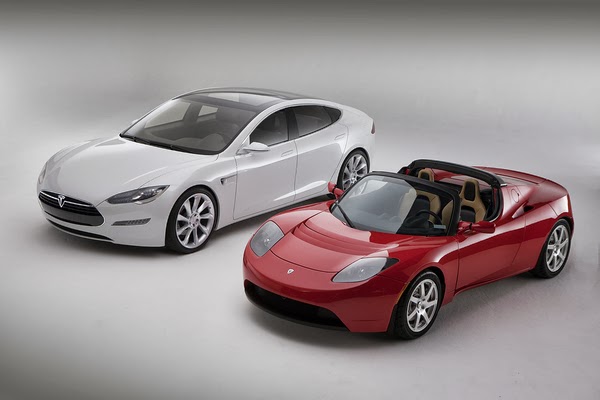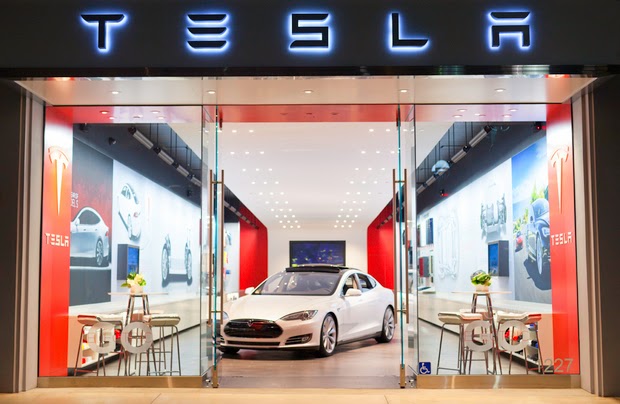Elon Musk has gone to Detroit for the North American International Auto Show (NAIAS) this week preaching that between climate change and fracking there’s an urgent necessity to switch to electrified vehicles and establish a price on carbon. The comments came in a long (1 hour) interview with Bloomberg News full of hard hitting questions about Tesla Motors’ role in the auto industry, its plans and chances of success.
In the very first words out of his mouth, Musk said that, between fracking and OPEC’s recent opening salvo in a global oil price war, we can no longer count on the gasoline price as a forcing function in buying electric cars. That is – high gasoline prices “force” the market consumers (us) to look for alternatives to gasoline (or diesel). The economics inevitably lead people to electric cars because the effective fuel cost is so low. But, with gasoline at $2.50/gallon (as it is in Northern California) or less, the gap between electricity fuel cost and gasoline fuel cost is shrinking and will obviously not be as strong a driving factor.
Hence, since we cannot count on gasoline price as a forcing function, Mr. Musk, the question is what forcing function will replace high gasoline prices? He wasn’t directly asked this, but towards the end of the interview he discussed the inherent superiority of electric drive trains. The quiet smooth ride, higher efficiency, lower noise, higher torque, etc, all go together when packaged well to make a superior vehicle. He also mentioned the need to set a price on carbon.
Musk is still highly confident of Tesla’s chance of success – but said the question is the magnitude of that success. Will the company plateau to 0.1% of the market, remaining a niche player, or will they break out and become a truly huge force in the market? That remains to be seen as events play out over the next few years.
He feels confident predicting Tesla Motors will be selling a few million cars/year by 2025. Getting there, he said, will require the other car companies also stepping up their game with significant numbers of electric car sales. In that context, Tesla will then ride the market to that sales/production level. Maybe he’s right, that Tesla won’t be able to grow the EV market solely on its own back to the level of several million vehicles per year?
Most of the car industry is stuck in a chicken-and-egg quandary. Is it safe for, say, Dodge/Chrysler/Fiat, whose CEO last year begged customers to stop buying Fiat 500e’s, to make the many $billions of investment to radically increase electric car production? If the customers aren’t there for the cars, the investment in production capacity doesn’t make sense.
Nissan (and to an extent GM) are an exception to this reluctance by automakers to get the game going.
Both the sales and service models at Tesla Motors are due to change as the company’s production and sales grow.
In the sales arena – the intention is to stick with the direct sales model until the company establishes a strong foundation (brand and status) with their own stores. And the production rate needs to get ahead of demand. Currently Tesla has more customers placing orders than they have production capacity to fill orders, and there is a significant wait between purchase and delivery.
They’re willing to set up other sales models – eventually – when production catches up with sales, and when they identify an arrangement which will give the customers a great experience in service and sales.
It’s Musks’ belief that he expresses repeatedly that Tesla’s customers have an awesome sales and service experience right now. I’m on record questioning the latter. I’m certain the service experience is excellent, but am concerned that Tesla has a proprietary lock-hold on servicing Tesla’s cars.
The rest of the automotive industry works with not only independent car dealerships for sales, but independent service centers for service. While the current model is highly flawed, it does give the customer freedom to choose among competing service centers, and provides some insulation against the car maker being abusive towards their customers. (at the risk of crooked car repairmen …)

![]() Musk has repeatedly said Tesla’s service operation isn’t required as a business goal to make a profit. Instead the service operation is chartered to create an excellent customer experience, which then serves their marketing goal of building excellent goodwill among the customers. What I’m wondering is, how long will Tesla stick to that policy? Will Tesla grow big enough to lose sight of that goal of an excellent customer experience?
Musk has repeatedly said Tesla’s service operation isn’t required as a business goal to make a profit. Instead the service operation is chartered to create an excellent customer experience, which then serves their marketing goal of building excellent goodwill among the customers. What I’m wondering is, how long will Tesla stick to that policy? Will Tesla grow big enough to lose sight of that goal of an excellent customer experience?
We’ll have to see what Tesla announces for the new service model. Maybe there’s a balance that can be struck where Tesla doesn’t have a proprietary lock-hold, while assuring the customers of an awesome experience?
As it is, Tesla Motors sales volume is barely a blip in the total car market. The company has a long ways to go before achieving its real goal of transforming the automotive industry and saving us all from climate change meltdown. At the same time the indicators from the climate scientists are dire.
We do urgently need to change the system to drastically decrease the amount of pollution spewed by our society.
- Highway design could decrease death and injury risk, if “we” chose smarter designs - March 28, 2015
- GM really did trademark “range anxiety”, only later to abandon that mark - March 25, 2015
- US Government releases new regulations on hydraulic fracturing, that some call “toothless” - March 20, 2015
- Tesla Motors magic pill to solve range anxiety doesn’t quite instill range confidence - March 19, 2015
- Update on Galena IL oil train – 21 cars involved, which were the supposedly safer CP1232 design - March 7, 2015
- Another oil bomb train – why are they shipping crude oil by train? – Symptoms of fossil fuel addiction - March 6, 2015
- Chevron relinquishes fracking in Romania, as part of broader pull-out from Eastern European fracking operations - February 22, 2015
- Answer anti- electric car articles with truth and pride – truth outshines all distortions - February 19, 2015
- Apple taking big risk on developing a car? Please, Apple, don’t go there! - February 16, 2015
- Toyota, Nissan, Honda working on Japanese fuel cell infrastructure for Japanese government - February 12, 2015














